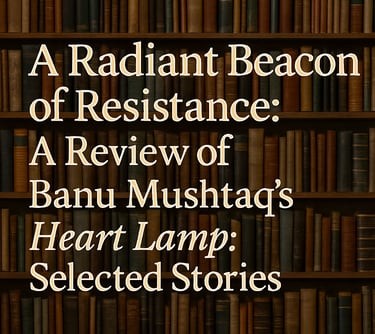Heart Lamp by Banu Mushtaq - 2025 Booker Prize
BOOKS REVIEW
Chaifry
6/1/20253 min read
Banu Mushtaq, a Kannada writer, lawyer, and women’s rights activist, achieved a historic milestone with Heart Lamp: Selected Stories (2024), translated by Deepa Bhasthi, as the first short story collection and Kannada-language work to win the 2025 International Booker Prize. Published by And Other Stories, this collection of 12 stories, spanning 1990 to 2023, illuminates the lives of Muslim women in Karnataka, India, with wit, compassion, and unflinching social critique. Rooted in the progressive Bandaya Sahitya movement, Mushtaq’s narratives expose the intersections of patriarchy, caste, and religion. This review argues that Heart Lamp is essential reading for its vibrant storytelling and Bhasthi’s evocative translation, particularly for Indian readers, as it mirrors their socio-cultural struggles, amplifies


marginalized voices, and inspires resistance against systemic oppression, making it a vital text for understanding resilience within India’s diverse tapestry.
Heart Lamp weaves 12 stories that capture the struggles and quiet rebellions of Muslim women in southern India. Selected and translated by Deepa Bhasthi, the stories are drawn from Mushtaq’s activism, portraying characters who navigate oppressive structures with resilience. In “Stone Slabs for Shaista Mahal,” a girl sacrifices her education for her siblings: “No matter which religion one belongs to, it is accepted that the wife is the husband’s most obedient servant, his bonded labourer” (Mushtaq, 2024, p. 87).
In “Fire Rain,” Arifa confronts poverty and maternal burdens: “How was she to feed her children, who were like monkeys without tails?” (Mushtaq, 2024, p. 45). The title story, “Heart Lamp,” depicts Mehrun’s anguish under familial pressure: “If you had the sense to uphold our family honour, you would have set yourself on fire and died” (Mushtaq, 2024, p. 112). “The Arabic Teacher and Gobi Manchuri” injects humor, with a tutor seeking a bride skilled in cooking: “He wanted a wife who could make Gobi Manchuri just right” (Mushtaq, 2024, p. 63). The collection culminates in “Be a Woman Once, Oh Lord!,” a plea to God: “If you were to build the world again, to create males and females again, do not be like an inexperienced potter. Come to earth as a woman, Prabhu!” (Mushtaq, 2024, p. 189). These stories blend oppression, humor, and defiance against the vibrant backdrop of Karnataka’s communities.
Heart Lamp is a literary triumph, distinguished by Mushtaq’s ability to craft vivid characters within concise, powerful narratives. Her prose, enriched by Bhasthi’s “radical translation” that retains the “Kannada hum” (The Guardian, 2025), balances humor and tragedy, as seen in “The Arabic Teacher and Gobi Manchuri,” where comedic matchmaking reveals gender dynamics. Mushtaq’s activism infuses authenticity, with characters like Arifa in “Fire Rain” reflecting real-world struggles against poverty and patriarchy. The collection’s feminist lens, rooted in the Bandaya movement, challenges societal norms, culminating in the poignant plea of “Be a Woman Once, Oh Lord!,” a universal call for empathy and justice.
For Indian readers, Heart Lamp resonates deeply, reflecting the lived realities of caste, gender, and religious marginalization, particularly within Muslim communities in southern India. Its cultural specificity—evident in references to local dishes like Gobi Manchuri or Karnataka’s social fabric—grounds the stories in a distinctly Indian context, making them a mirror for readers confronting similar oppressions. Bhasthi’s translation, praised for its “plurality of Englishes” (The Washington Post, 2025), preserves Kannada idioms, enhancing accessibility while retaining authenticity.
However, the collection’s focus on suffering can feel repetitive, with stories like “Fire Rain” and “Heart Lamp” occasionally overlapping in tone, potentially taxing readers. The cultural specificity, while a strength, may challenge readers unfamiliar with Karnataka’s socio-religious nuances, requiring contextual effort. Nevertheless, the humor in stories like “A Decision of the Heart,” where a suitor is comically rebuffed, ensures a dynamic, engaging read.
Heart Lamp: Selected Stories is a radiant collection that illuminates the resilience of Muslim women in southern India, blending wit, compassion, and sharp social critique. Mushtaq’s storytelling, amplified by Bhasthi’s evocative translation, offers a profound exploration of gender, faith, and defiance. For Indian readers, the collection is a powerful reflection of their socio-cultural struggles, urging resistance against patriarchal and caste-based oppression. Minor issues, such as thematic repetition and cultural specificity, do not diminish its brilliance. This collection is highly recommended for those seeking literature that champions marginalized voices and challenges systemic injustices, affirming Mushtaq’s historic Booker win as a testament to her universal storytelling.
References: Mushtaq, B. (2024). Heart Lamp: Selected Stories (D. Bhasthi, Trans.). And Other Stories.
